- Homepage
- Herbs Spices
Best medicinal herbs: spice up your cooking and improve your well-being
Best medicinal herbs recommends not waiting for the day of serious illness to arrive but rather make sure that you include some of these basics in your food on a regular basis; simply for the flavour they impart to your cooking, quite apart from their wellness benefits makes them worth all the effort.
And just to confuse you, I am going to throw in our favourite spices too; the distinction is technical.
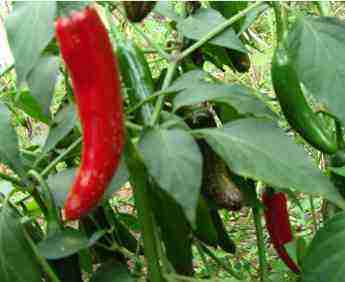
This page was last updated by Dr Bernard Preston on 9th March, 2025.
Herbs and spices make up a vital and huge subject, worth a site all on their own; these are just a few of Bernard Preston's favourites. Should you be only starting out, and it is astonishing how many folk never add any of these gems to their food, then just where do you begin?
Perhaps I should call this a starter's guide to the best medicinal herbs and spices in our garden.
All foods have one great enemy; oxygen is its name. Once you pick them from the plant, and remove their skins or shells, decay starts and they rapidly lose their essential value. So I strongly advocate against buying an array of herbs and spices in large bottles that will sit on your kitchen shelf with the dregs used only years later.
They will not only taste dreadful but add very little of value to your well-being.
Rather grow them yourself and enjoy them fresh from the garden, if you possibly can. Freeze them or regularly buy small quantities at a herb shop and make sure you finish them within a few months at most.
For example I recently ran out of paprika from our freezer; it was midsummer and the fruit in our garden was still grass-green. Scratching around in the kitchen cupboard I found an old half-full bottle. So, desperate, I added a teaspoon to our authentic hummus recipe; it was utterly tasteless. I might as well not have bothered.
Hummus
In fact hummus is a good place to introduce the subject of herbs and spices in your cooking. No doubt about it, we have been conned into believing we need only eat those foods that are appealing to our senses. It is a terrible lie and an utterly ingenuous way to approach picking out items from the supermarket and greengrocer's shelves.
But the fact is that our families reach for foods that tickle their tongues, and eschew those that are rather tasteless.
The chickpea in hummus is the most important protein source in the whole world, but it really is a largely tasteless legume. So tradition has it that we add flavours to dicky it up.
Another way is to ferment your chickpeas; and use the water they are cooked in. It is time to cash in on the best medicinal herbs and spices like cumin.
We will use them as a kicking off spot for our favourite herbs and spices.
Use them imaginatively to make some of these herb and spice butters.
Best medicinal herbs
Best medicinal herbs gives you a guide to a few of our favourites.
Parsley
Parsley is one of the most important greens in your garden; it is used in all traditional hummus recipes. A rich source of magnesium, folate and vitamin B6 all of which are needed to breakdown toxic homocysteine in the blood; they make it a very best medicinal herb. It's a veritable capsule of health.
We enjoy the nutritional value of parsley virtually every day in our food; whether it is chopped up in a summer salad, sprinkled on scrambled eggs or in our hummus, for example. It is one of the most important herbs to lower cholesterol. Just so that I can have my butter and eat it; cake only on high and holy days.
As a parsley pesto it will dicky up any green salad that your family may find rather boring.
And this chimichurri sauce for preserving parsley makes a wonderful condiment for many of your dishes.
Make homemade gremolata with garden herbs like parsley; it's a very simple old Italian favourite condiment using lemon rind and garlic.
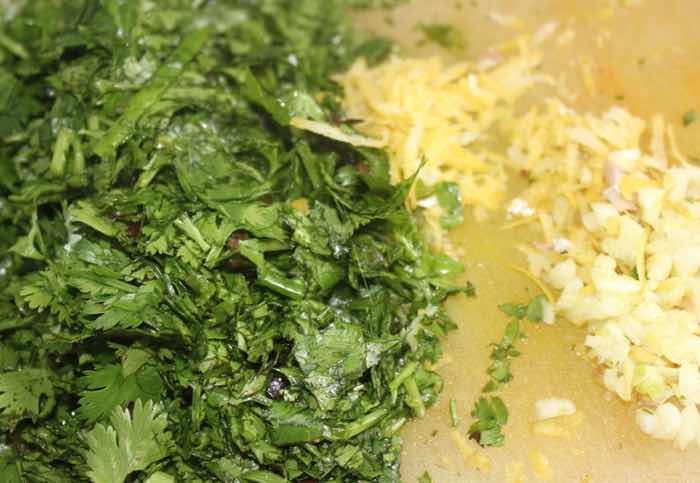 Make gremolata with green herbs, lemon zest and garlic.
Make gremolata with green herbs, lemon zest and garlic.From the horse's mouth
Paprika
Paprika is without a doubt one of the world's most loved spices; along with laughter it definitely fits in with best medicine. Most folk use it dried and I believe lose out on many of its great benefits.
Whenever we have a surplus in the garden, or see them going cheap at the greengrocer, we simply chop them up, including the seeds and placenta which is where the capsaicin is found; a powerful anti-inflammatory agent. Freeze them in well-labelled packets.
You need to know how to preserve jalapeno peppers, for example.
Then you can add whole chunks of jalapenos, peppadews or cayenne to your cooking, depending on how spicy you want it. A slither always finds its way into our otherwise rather dull hummus.
Spice up your cooking with the best medicinal herbs.
Cumin
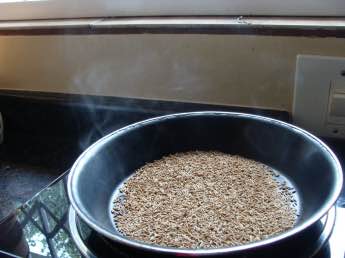
Cumin is one of the best medicinal herbs used by the ancients, mostly in relation to its anti-inflammatory properties in regard to the sexual organs; it also apparently also helps with the nausea of pregnancy, enhances memory and cognition. This has only been proved in rat studies. It is needed regularly by young and old alike.
We enjoy it for its pungent, slightly bitter flavour; I especially love the day, perhaps every two or three weeks when I roast the seeds prior to grinding them and storing them under olive oil. I can get high with a little help from friends like cumin; the warm, aromatic scent is of heaven, not unlike an incense.
Do yourself a favour and do not buy a bottle and keep it in your spice rack where it gets old and stale; roast and grind it regularly and store it in the refrigerator(2).
Cumin is an essential ingredient of any authentic hummus recipe; so you could say that we enjoy it almost daily.
For more details, read what is cumin?
Mixed with honey, cumin is often used as an aphrodisiac in the Middle East(1).
Simply adding cumin plus lime daily to your cooking is more effective than a popular weight-loss drug. Let your food be your medicine.
Coriander
Coriander has an important place in our best medicinal herbs chest; and our kitchen menu.
It has a host of proven properties from containing a phytonutrient called dodecenal which is twice as effective as antibiotics in controlling infectious Salmonella; especially important for those keeping hens.
The bug may also lurk in the meat and eggs from the supermarket; it is proven to lower blood sugar and the bad cholesterol too. It also contains many other phytonutrients like kaempferol(3) that have been shown to reduce the risk of getting malignant tumours.
Just as important freshly-ground coriander seeds are delicious in many of our spicy and curry dishes; and the green cilantro in our salads.
It is our philosophy that having small amounts of herbs and spices like coriander regularly in our food is what gives us protection against these nasty diseases. We glibly trot out that prevention is better than a cure, but it is rarely practised.
By growing coriander in your own garden, it thrives like a weed, sowing itself you will enhance your food and protect yourself against dread disease; what is known as a functional food.
This homemade cilantro gremolata with garden herbs is a great favourite; freeze it for year-round enjoyment.
Chives
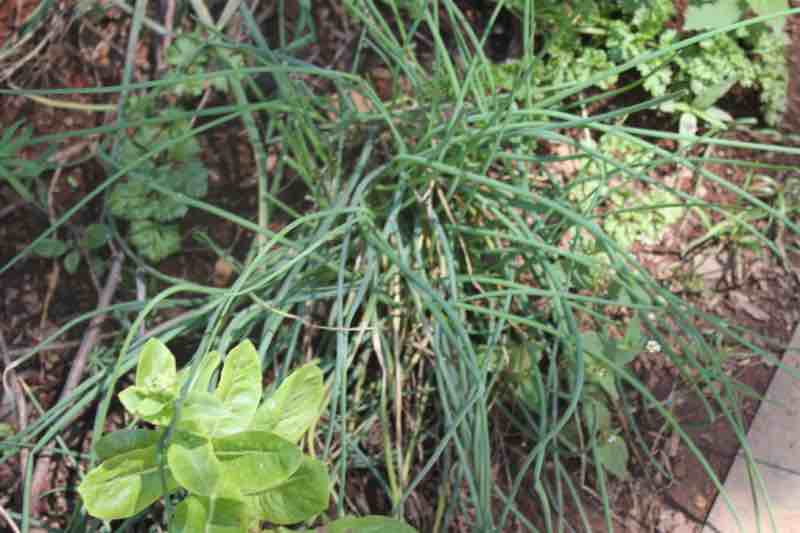
The more slender the plant, the more important it is to have it fresh from the garden. There is nothing simpler than growing chives. Ask around amongst your friends and you are sure to have at least one who split theirs with you.
It's a hardy perennial for every garden. They do well in pots too.
Our pork slithers and chives lunch dish is one of the quickest meals to prepare; simple and delicious. Add some of the gremolata mentioned above for more flavour.
Lemongrass
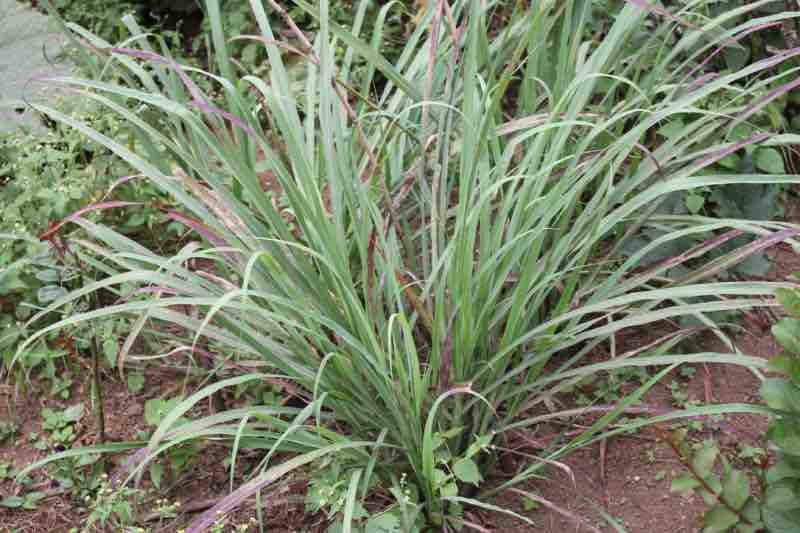
The aromatic scent of lemongrass has long been known to the people of the East to add an extra dimension to soups, stews and curries; just ask the Thai people.
What to do with lemongrass became a topic of interest in our home after a visit to a Thai restaurant. It's easy to grow in a mild climate and we enjoy it regularly in our cooking. It is frost resistant, dying back in the winter but shooting again in spring.
Here are a few tips on how to care for lemongrass.
Ginger
There are two ways to take these best medicinal herbs and spices like ginger, for example. The first is to swallow a specific remedy for a complaint; you may want it for an attack of sinusitis. Perhaps better still, though, is simply to include these plants regularly in your cooking.
I enjoy it regularly in the evening as a tonic to help me sleep, and an alternative to alcohol. This very simple spicy ginger tea recipe can literally be brewed in minutes.
Try and avoid using the dried condiments in bottles and packets unless you finish them fairly quickly. Once oxygen gets to them, they lose their value.
Ginger is reputed to help everything from allopecia to athlete's foot. I am kidding of course, but there is research indicating its powerful tumour-reducing properties[5].
But obviously do not wait until you have a tumour and expect a miracle; think preventative medicine and include it regularly in your cooking. We would often put a few slithers into our easy butternut soup recipe for example. Another is the peanut and ginger sauce which will add some zing to any dull green salad.
Ginger helps prevent the spread of cancer cells by restraining the hyperactivity of our immune systems; there are many good reasons to enjoy the spice regularly in our food.
Dijon Mustard
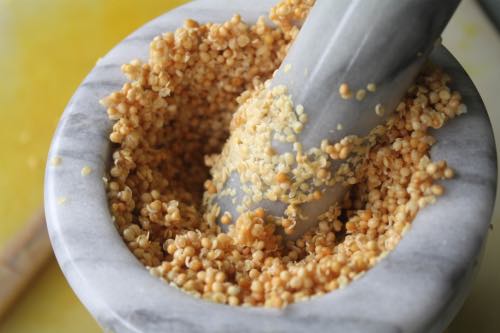 So simple, just add white wine and vinegar
So simple, just add white wine and vinegarCan I make Dijon mustard? Yes, I certainly can for a fraction of the price; and without the noxious chemicals food manufacturers love to add to their products.
Sweet basil
Whilst often hard-pressed to make a choice, sweet basil is simply my favourite best medicinal herb; the scent on your fingers as you pick it, the flavour it imparts to your cooking and its healing properties are simply divine.
If you are unconvinced, then read what is basil. It will grow indoors but like all herbs enjoys the sunlight.
It has two particular properties which I love. Firstly, any herb that will inhibit the action of the COX 2 enzyme will impress your muscles and joints. It acts like Brufin as an anti-inflammatory[4]; the effect comes from the herbs eugenol oil.
Secondly any lover of good food will know that an easy sweet basil pesto recipe will turn a dull green salad into a wonder. Turn it into a gremolata for a variation.
Thyme
For me the real value of thyme herb benefits is the outstanding flavour that it lends to what might be rather dull tasting food. Take roasted butternut, for example; I love it but by the end of a long autumn, with fifty giants from the garden, it becomes a little boring. You press on eating it because of all those beta-carotenes, but just a sprig of thyme, a couple cloves of garlic and a whole peppadew in the bowl make such a difference.
It is also a part of the daily anti-inflammatory regimen that we should all be taking every single day, or suffer from even more pain in our joints and muscles.
It is used in patients with malignant tumours to reduce candida and the ancients even believed it gives you courage.
I would rather enjoy these best medicinal herbs than visit your DC or therapist twice a week; would you not too? It may even give you some fight back when faced with an overly bossy manager.
Mind you, it keeps me in business that folk refuse to exercise their bodies, and eat good wholesome food like our grannies once served up.
Toss a sprig of thyme into your Eggs Florentine this morning for breakfast; it can get a little dull.
Turmeric
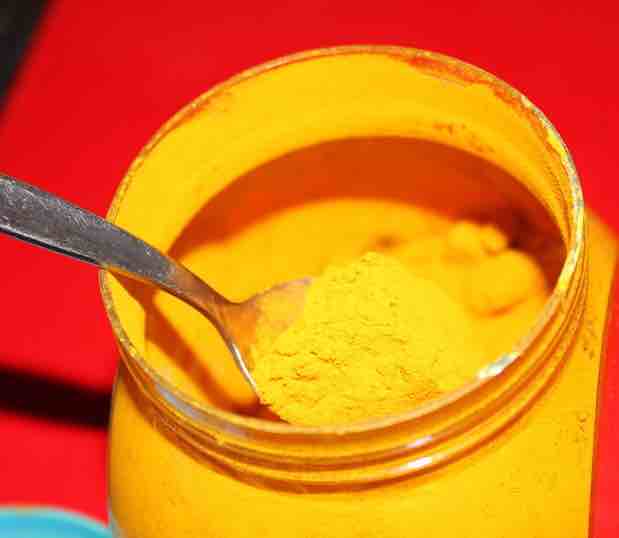
Turmeric is a first cousin of ginger and has many similar benefits, as they both contain the active ingredient curcumin. There is strong research showing that it delays the onset of diabetes, helps in blood sugar management and increases the cells' sensitivity to insulin[6].
Secondly it has been shown that turmeric gives protection to the cells that produce dopamine[7], so important for help in preventing Parkinson's disease and certain conditions of the eyes; and as an anti-inflammatory agent as effective as diclofenac without the side effects pertaining to long term use of NSAIDs.
For the research confirming these claims read more at does turmeric help with inflammation?
This site is about prevention of these nasty diseases, not trying to cure them after onset, so we propose you use them daily in smaller amounts in your food; for example, we enjoy the wonderful rich flavour of turmeric in Eggs Parkinson's disease most days for breakfast.
What is the best way to use turmeric? Actually it's a very easy spice to grow in a mild climate.
Fried bulgur wheat with turmeric is one of the true whole grain dishes; most are highly refined today.

Treatment for bedsores at home may be improved with turmeric and raw honey.
Arugula, also known as rocket
Arugula is one of the easiest and most satisfying of greens to grow in the garden; it adds a a little mystery to an otherwise dull lettuce salad.
More important it is a rich source of glucoraphanin, and its first cousin sulforaphane, phytonutrients that scientists are becoming increasingly excited about for their benefits as antioxidants.
Grow your own rocket rather than taking it in pill form at many times the cost. Let your food be your medicine.
Read more at the nutrition of arugula.
Cinnamon
Cinnamon and diabetes have a profound synergy. Those suffering from T2D after enjoying just a teaspoon a day will find that their blood glucose after eating a starchy meal is reduced by nearly a third.
We love it for its sweet, aromatic flavour giving a hint of the spice islands in much of our cooking; we have it almost daily throughout the year in this easy butternut squash recipe and other favourites. I am not exaggerating.
It really has a strong fit with our best medicinal herbs and spices page, but it is no panacea; all those with either frank or prediabetes, as I am, must limit their refined carbohydrate and take a walk after a starchy meal. The alternative is too ghastly to contemplate; it is one of the most horrible diseases when badly managed, making us very prone to the coronavirus too.
- What is stabilizer in food is an interesting and important question to consider.
- What is emulsifier in food?
What herb is best for healing?
Most experts would be hard pressed to choose a best herb for healing. Personally I would put turmeric, parsley and garlic at the top of my list.
Sources and references
1 Cumin seeds @ World's Healthiest Foods
2 Cumin seeds vs ground cumin @ Tastessence
6 Curcumin in turmeric for prevention of T2D
7 An overview of Parkinson's disease: Curcumin as a possible alternative treatment
When browsing use right click and "Open Link in New Tab" or you may get a bad gateway signal.
The material expressed on this page is gleaned from the nutritional and environmental literature; it is clearly referenced. A plain distinction is made between the author's opinion and that which is scientifically proven. When in doubt consult your health professional.
To suggest a correction or clarification, write to Dr Bernard Preston here. Contact.
Newsletter
Our newsletter is entitled "create a cyan zone" at your home, preserving both yourself and Mother Earth for future generations; and the family too, of course. We promise not to spam you with daily emails promoting various products. You may get an occasional nudge to buy one of my books.
Here are the back issues.
- Lifestyle and ideal body weight
- What are ultra-processed foods?
- Investing in long-term health
- Diseases from plastic exposure
- Intensive lifestyle management for obesity has limited value
- A world largely devoid of Parkinson's Disease
- The impact of friendly bacteria in the tum on the prevention of cancer
- There's a hole in the bucket
- Everyone is talking about weight loss drugs
- Pull the sweet tooth
- If you suffer from heartburn plant a susu
- Refined maize meal and stunting
- Should agriculture and industry get priority for water and electricity?
- Nature is calling
- Mill your own flour
- Bake your own sourdough bread
- Microplastics from our water
- Alternative types of water storage
- Wear your clothes out
- Comfort foods
- Create a bee-friendly environment
- Go to bed slightly hungry
- Keep bees
- Blue zone folk are religious
- Reduce plastic waste
- Family is important
- What can go in compost?
- Grow broad beans for longevity
- Harvest and store sunshine
- Blue zone exercise
- Harvest and store your rainwater
- Create a cyan zone at your home
Did you find this page interesting? How about forwarding it to a friendly book or food junkie? Better still, a social media tick would help.
- Homepage
- Herbs Spices
Address:
56 Groenekloof Rd,
Hilton, KZN
South Africa
Website:
https://www.bernard-preston.com